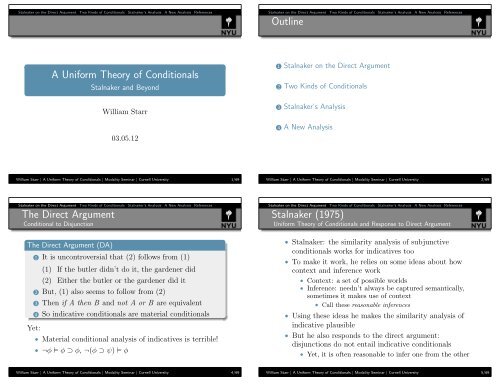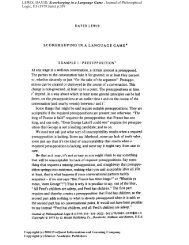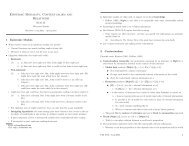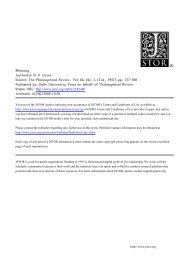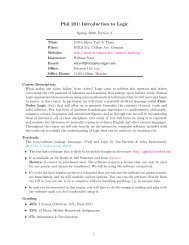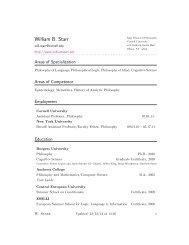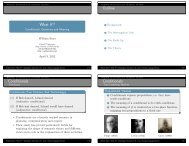A Uniform Theory of Conditionals: Beyond Stalnaker - Will Starr
A Uniform Theory of Conditionals: Beyond Stalnaker - Will Starr
A Uniform Theory of Conditionals: Beyond Stalnaker - Will Starr
You also want an ePaper? Increase the reach of your titles
YUMPU automatically turns print PDFs into web optimized ePapers that Google loves.
<strong>Stalnaker</strong> on the Direct Argument Two Kinds <strong>of</strong> <strong>Conditionals</strong> <strong>Stalnaker</strong>’s Analysis A New Analysis References<br />
<strong>Stalnaker</strong> on the Direct Argument Two Kinds <strong>of</strong> <strong>Conditionals</strong> <strong>Stalnaker</strong>’s Analysis A New Analysis References<br />
Outline<br />
A <strong>Uniform</strong> <strong>Theory</strong> <strong>of</strong> <strong>Conditionals</strong><br />
<strong>Stalnaker</strong> and <strong>Beyond</strong><br />
<strong>Will</strong>iam <strong>Starr</strong><br />
03.05.12<br />
1 <strong>Stalnaker</strong> on the Direct Argument<br />
2 Two Kinds <strong>of</strong> <strong>Conditionals</strong><br />
3 <strong>Stalnaker</strong>’s Analysis<br />
4 A New Analysis<br />
<strong>Will</strong>iam <strong>Starr</strong> | A <strong>Uniform</strong> <strong>Theory</strong> <strong>of</strong> <strong>Conditionals</strong> | Modality Seminar | Cornell University 1/69<br />
<strong>Will</strong>iam <strong>Starr</strong> | A <strong>Uniform</strong> <strong>Theory</strong> <strong>of</strong> <strong>Conditionals</strong> | Modality Seminar | Cornell University 2/69<br />
<strong>Stalnaker</strong> on the Direct Argument Two Kinds <strong>of</strong> <strong>Conditionals</strong> <strong>Stalnaker</strong>’s Analysis A New Analysis References<br />
The Direct Argument<br />
Conditional to Disjunction<br />
The Direct Argument (DA)<br />
Yet:<br />
1 It is uncontroversial that (2) follows from (1)<br />
(1) If the butler didn’t do it, the gardener did<br />
(2) Either the butler or the gardener did it<br />
2 But, (1) also seems to follow from (2)<br />
3 Then if A then B and not A or B are equivalent<br />
4 So indicative conditionals are material conditionals<br />
• Material conditional analysis <strong>of</strong> indicatives is terrible!<br />
• ¬φ φ ⊃ φ, ¬(φ ⊃ ψ) φ<br />
<strong>Stalnaker</strong> on the Direct Argument Two Kinds <strong>of</strong> <strong>Conditionals</strong> <strong>Stalnaker</strong>’s Analysis A New Analysis References<br />
<strong>Stalnaker</strong> (1975)<br />
<strong>Uniform</strong> <strong>Theory</strong> <strong>of</strong> <strong>Conditionals</strong> and Response to Direct Argument<br />
• <strong>Stalnaker</strong>: the similarity analysis <strong>of</strong> subjunctive<br />
conditionals works for indicatives too<br />
• To make it work, he relies on some ideas about how<br />
context and inference work<br />
• Context: a set <strong>of</strong> possible worlds<br />
• Inference: needn’t always be captured semantically,<br />
sometimes it makes use <strong>of</strong> context<br />
• Call these reasonable inferences<br />
• Using these ideas he makes the similarity analysis <strong>of</strong><br />
indicative plausible<br />
• But he also responds to the direct argument:<br />
disjunctions do not entail indicative conditionals<br />
• Yet, it is <strong>of</strong>ten reasonable to infer one from the other<br />
<strong>Will</strong>iam <strong>Starr</strong> | A <strong>Uniform</strong> <strong>Theory</strong> <strong>of</strong> <strong>Conditionals</strong> | Modality Seminar | Cornell University 4/69<br />
<strong>Will</strong>iam <strong>Starr</strong> | A <strong>Uniform</strong> <strong>Theory</strong> <strong>of</strong> <strong>Conditionals</strong> | Modality Seminar | Cornell University 5/69
<strong>Stalnaker</strong> on the Direct Argument Two Kinds <strong>of</strong> <strong>Conditionals</strong> <strong>Stalnaker</strong>’s Analysis A New Analysis References<br />
<strong>Stalnaker</strong> on Context<br />
A Set <strong>of</strong> Possible Worlds c<br />
<strong>Stalnaker</strong> on the Direct Argument Two Kinds <strong>of</strong> <strong>Conditionals</strong> <strong>Stalnaker</strong>’s Analysis A New Analysis References<br />
<strong>Stalnaker</strong> on Context and Assertion<br />
Shinking c<br />
• Context: the common assumptions <strong>of</strong> the<br />
conversational participants<br />
• This is information the speaker can expect her<br />
interlocutors to use to interpret her utterances<br />
• These assumptions needn’t be true, nor actual beliefs<br />
• This common information can be thought <strong>of</strong> as a set <strong>of</strong><br />
possible worlds<br />
• The set <strong>of</strong> worlds not ruled out by the common<br />
assumptions<br />
• The conversationally ‘live’ possibilities<br />
• Successful assertions change the shared assumptions <strong>of</strong><br />
the conversationalists<br />
• Therefore, they must change c too<br />
• How should we change c to reflect that a new<br />
proposition p has been accepted?<br />
• Eliminate all the worlds in c that incompatible with p:<br />
• c ′ = c ∩ p<br />
• This shrinks the set <strong>of</strong> live possibilities<br />
• <strong>Stalnaker</strong> calls this the context set c<br />
<strong>Will</strong>iam <strong>Starr</strong> | A <strong>Uniform</strong> <strong>Theory</strong> <strong>of</strong> <strong>Conditionals</strong> | Modality Seminar | Cornell University 6/69<br />
<strong>Will</strong>iam <strong>Starr</strong> | A <strong>Uniform</strong> <strong>Theory</strong> <strong>of</strong> <strong>Conditionals</strong> | Modality Seminar | Cornell University 7/69<br />
<strong>Stalnaker</strong> on the Direct Argument Two Kinds <strong>of</strong> <strong>Conditionals</strong> <strong>Stalnaker</strong>’s Analysis A New Analysis References<br />
<strong>Stalnaker</strong> on Reasonable Inference<br />
Context Changes During an Inference<br />
• For A to semantically entail B:<br />
• Every world in which A is true, B must be true<br />
• But on <strong>Stalnaker</strong>’s model <strong>of</strong> context, sometimes we<br />
ignore certain worlds<br />
• Worlds outside c<br />
• Sometimes A may not entail B but it may be<br />
reasonable to infer B from A in c<br />
Reasonable Inference<br />
The inference from A to B is reasonable in c iff<br />
c ′ = A c ∩ c, and c ′ ⊆ B c ′<br />
• The proposition expressed by A in c, together with c<br />
entails the proposition expressed by B in c ∩ A c<br />
<strong>Stalnaker</strong> on the Direct Argument Two Kinds <strong>of</strong> <strong>Conditionals</strong> <strong>Stalnaker</strong>’s Analysis A New Analysis References<br />
<strong>Stalnaker</strong>’s <strong>Uniform</strong> Analysis<br />
Overview and Semantics<br />
• <strong>Stalnaker</strong>’s tact: give a semantics for (if φ) ψ that is<br />
plausible for both indicatives and subjunctives<br />
• Maintain that indicatives and subjunctives have<br />
identical semantics, but differ pragmatically<br />
Semantics for Both Varieties (<strong>Stalnaker</strong> 1968, 1975)<br />
1 (if φ) ψ is true at w if and only if ψ is true at all <strong>of</strong> the<br />
φ-worlds most similar to w<br />
2 (if φ) ψ f = {w | f(w, φ f ) ⊆ ψ f }<br />
• f(w, φ f ): the set <strong>of</strong> φ-worlds most similar to w<br />
• f obeys three constraints, e.g. f(w, p) ⊆ p<br />
<strong>Will</strong>iam <strong>Starr</strong> | A <strong>Uniform</strong> <strong>Theory</strong> <strong>of</strong> <strong>Conditionals</strong> | Modality Seminar | Cornell University 8/69<br />
<strong>Will</strong>iam <strong>Starr</strong> | A <strong>Uniform</strong> <strong>Theory</strong> <strong>of</strong> <strong>Conditionals</strong> | Modality Seminar | Cornell University 9/69
<strong>Stalnaker</strong> on the Direct Argument Two Kinds <strong>of</strong> <strong>Conditionals</strong> <strong>Stalnaker</strong>’s Analysis A New Analysis References<br />
<strong>Stalnaker</strong>’s <strong>Uniform</strong> Analysis<br />
The Pragmatics <strong>of</strong> Indicatives<br />
<strong>Stalnaker</strong> on the Direct Argument Two Kinds <strong>of</strong> <strong>Conditionals</strong> <strong>Stalnaker</strong>’s Analysis A New Analysis References<br />
<strong>Stalnaker</strong> on Disjunction<br />
Appropriateness Conditions<br />
Pragmatics for Indicatives (<strong>Stalnaker</strong> 1975: 69)<br />
1 (if φ) ψ is true in c at w ∈ c iff:<br />
• ψ is true at all <strong>of</strong> the φ-worlds in c most similar to w<br />
2 (if φ) ψ c,f = {w ∈ c | f(w, φ c,f ∩ c) ⊆ ψ c,f }<br />
Appropriateness <strong>of</strong> Disjunctions (<strong>Stalnaker</strong> 1975: 71)<br />
• Disjunctive assertions appropriate only in a context<br />
where either disjunct to be true without the other<br />
• An assertion <strong>of</strong> A ∨ B is appropriate if<br />
• There is a A ∧ ¬B-world in c<br />
• There is a ¬A ∧ B-world in c<br />
• Suppose we’ve ruled out the possibility that the Butler<br />
did it and the gardener didn’t.<br />
(3) ?? Either the Butler did it, or the gardener did it.<br />
<strong>Will</strong>iam <strong>Starr</strong> | A <strong>Uniform</strong> <strong>Theory</strong> <strong>of</strong> <strong>Conditionals</strong> | Modality Seminar | Cornell University 10/69<br />
<strong>Will</strong>iam <strong>Starr</strong> | A <strong>Uniform</strong> <strong>Theory</strong> <strong>of</strong> <strong>Conditionals</strong> | Modality Seminar | Cornell University 11/69<br />
<strong>Stalnaker</strong> on the Direct Argument Two Kinds <strong>of</strong> <strong>Conditionals</strong> <strong>Stalnaker</strong>’s Analysis A New Analysis References<br />
The Direct Argument is Reasonable<br />
From Or to If<br />
<strong>Stalnaker</strong> on the Direct Argument Two Kinds <strong>of</strong> <strong>Conditionals</strong> <strong>Stalnaker</strong>’s Analysis A New Analysis References<br />
Reasonable Inference<br />
Further Applications<br />
• Suppose B ∨ G is felicitously asserted in c 0<br />
• Then there are B ∧ ¬G and ¬B ∧ G-worlds in c 0<br />
• All ¬B ∧ ¬G-worlds are eliminated in<br />
c 1 = c 0 ∩ B ∨ G c<br />
• The inference to (if ¬B) G will be reasonable if<br />
(4) c 1 ⊆ (if ¬B) G c1 ,f<br />
• (if ¬B) G c1 ,f = {w ∈ c 1 | f(w, ¬B c1 ,f ∩ c 1 ) ⊆ G c1 ,f}<br />
• By Success ∀w : f(w, ¬B c1 ,f ∩ c 1 ) ⊆ (¬B c1 ,f ∩ c 1 )<br />
• Since all <strong>of</strong> the ¬B-worlds in c 1 are G-worlds, this<br />
means that f(w, ¬B c1 ,f ∩ c 1 ) ⊆ G c1 ,f<br />
• So (if ¬B) G c1 ,f = c 1 !<br />
• Condition (4) holds so, the inference is reasonable!<br />
• <strong>Stalnaker</strong>’s indicative semantics invalidates:<br />
Antecedent Strengthening A → B (A ∧ B) → C<br />
Disjunctive Antecedents<br />
(A ∨ B) → C (A → C) ∧ (B → C)<br />
Transitivity A → B, B → C A → C<br />
Contraposition A → B ¬B → ¬A<br />
• Yet they <strong>of</strong>ten sound plausible!<br />
• As it turns out, these are also reasonable inferences<br />
(w/a little tweaking)<br />
<strong>Will</strong>iam <strong>Starr</strong> | A <strong>Uniform</strong> <strong>Theory</strong> <strong>of</strong> <strong>Conditionals</strong> | Modality Seminar | Cornell University 12/69<br />
<strong>Will</strong>iam <strong>Starr</strong> | A <strong>Uniform</strong> <strong>Theory</strong> <strong>of</strong> <strong>Conditionals</strong> | Modality Seminar | Cornell University 13/69
<strong>Stalnaker</strong> on the Direct Argument Two Kinds <strong>of</strong> <strong>Conditionals</strong> <strong>Stalnaker</strong>’s Analysis A New Analysis References<br />
Two Kinds <strong>of</strong> <strong>Conditionals</strong><br />
Indicative and Subjunctive<br />
‘Indicative’ <strong>Conditionals</strong><br />
(5) a. If Bob danced, Leland danced<br />
b. If Bob is dancing, Leland is dancing<br />
‘Subjunctive’ <strong>Conditionals</strong><br />
Past (looking) antecedent + modal consequent<br />
(6) a. If Bob had danced, Leland would have danced<br />
b. If Bob had danced, Leland might have danced<br />
c. If Bob had danced, Leland could have danced<br />
d. If Bob danced, Leland would dance<br />
e. If Bob were to dance, Leland would dance<br />
<strong>Stalnaker</strong> on the Direct Argument Two Kinds <strong>of</strong> <strong>Conditionals</strong> <strong>Stalnaker</strong>’s Analysis A New Analysis References<br />
Two Kinds <strong>of</strong> <strong>Conditionals</strong><br />
Felicitous After Denying Antecedent?<br />
(7) a. # Bob never danced. If Bob danced, Leland<br />
danced.<br />
b. # Bob isn’t dancing. If Bob is dancing, Leland is<br />
dancing.<br />
(8) a. Bob never danced. If Bob had danced, Leland<br />
would have danced.<br />
b. Bob never danced. If Bob had danced, Leland<br />
might have danced.<br />
Felicitous After Denying Antecedent?<br />
1 Indicative conditionals? ×<br />
2 Subjunctive conditionals? ̌<br />
<strong>Will</strong>iam <strong>Starr</strong> | A <strong>Uniform</strong> <strong>Theory</strong> <strong>of</strong> <strong>Conditionals</strong> | Modality Seminar | Cornell University 15/69<br />
<strong>Will</strong>iam <strong>Starr</strong> | A <strong>Uniform</strong> <strong>Theory</strong> <strong>of</strong> <strong>Conditionals</strong> | Modality Seminar | Cornell University 16/69<br />
<strong>Stalnaker</strong> on the Direct Argument Two Kinds <strong>of</strong> <strong>Conditionals</strong> <strong>Stalnaker</strong>’s Analysis A New Analysis References<br />
Two Kinds <strong>of</strong> <strong>Conditionals</strong><br />
The Subjunctive Suggestion<br />
The Subjunctive Suggestion<br />
Assertions <strong>of</strong> if Bob had danced, Leland would have danced<br />
<strong>of</strong>ten suggest that Bob didn’t dance.<br />
• Evidence for the suggestion?<br />
• Infelicity <strong>of</strong> asserting that Bob did dance and then<br />
asserting the subjunctive conditional<br />
(9) # Bob definitely danced. If Bob had danced, Leland<br />
would have danced.<br />
• As discussed earlier in semester, this suggestion isn’t<br />
an entailment or presupposition<br />
<strong>Stalnaker</strong> on the Direct Argument Two Kinds <strong>of</strong> <strong>Conditionals</strong> <strong>Stalnaker</strong>’s Analysis A New Analysis References<br />
Two Kinds <strong>of</strong> <strong>Conditionals</strong><br />
Ingredients <strong>of</strong> a Subjunctive Antecedent<br />
(10) a. If Bob had danced, Leland would have danced<br />
b. If Bob were to dance, Leland would dance<br />
c. If Bob danced, Leland would dance<br />
• Antecedents: past tense look, not past meaning<br />
(11) Bob died yesterday. If he had died tomorrow instead,<br />
he would have been 98 years old.<br />
• Not possible w/genuine past tense had died<br />
(12) Yesterday I went to the Black Lodge. By the time I<br />
got there, Bob had died, but Cooper hadn’t.<br />
(13) # I will go to the Black Lodge tomorrow. By the time<br />
I get there, Bob had died, but Cooper hadn’t.<br />
<strong>Will</strong>iam <strong>Starr</strong> | A <strong>Uniform</strong> <strong>Theory</strong> <strong>of</strong> <strong>Conditionals</strong> | Modality Seminar | Cornell University 17/69<br />
<strong>Will</strong>iam <strong>Starr</strong> | A <strong>Uniform</strong> <strong>Theory</strong> <strong>of</strong> <strong>Conditionals</strong> | Modality Seminar | Cornell University 18/69
<strong>Stalnaker</strong> on the Direct Argument Two Kinds <strong>of</strong> <strong>Conditionals</strong> <strong>Stalnaker</strong>’s Analysis A New Analysis References<br />
Two Kinds <strong>of</strong> <strong>Conditionals</strong><br />
Ingredients <strong>of</strong> a Subjunctive Antecedent<br />
• Past tense does not contribute its normal meaning in<br />
subjunctive antecedents<br />
• This is not true for indicative antecedents<br />
(11) Bob died yesterday. If he had died tomorrow instead,<br />
he would have been 98 years old.<br />
{ }<br />
was<br />
(14) # If Bob died tomorrow, he<br />
98 years old<br />
will be<br />
• So we have one more difference between the two kinds<br />
<strong>Stalnaker</strong> on the Direct Argument Two Kinds <strong>of</strong> <strong>Conditionals</strong> <strong>Stalnaker</strong>’s Analysis A New Analysis References<br />
Two Kinds <strong>of</strong> <strong>Conditionals</strong><br />
The Data So Far<br />
Felicitous After Denying Antecedent?<br />
1 Indicative conditionals? ×<br />
2 Subjunctive conditionals? ̌<br />
The Subjunctive Suggestion<br />
Assertions <strong>of</strong> if Bob had danced, Leland would have danced<br />
<strong>of</strong>ten suggest that Bob didn’t dance.<br />
• Suggestion not asserted, presupposed or entailed<br />
Subjunctive Antecedents and Past Tense<br />
Unlike indicative antecedents, subjunctive ones have past<br />
tense morphology that does not have past tense meaning.<br />
<strong>Will</strong>iam <strong>Starr</strong> | A <strong>Uniform</strong> <strong>Theory</strong> <strong>of</strong> <strong>Conditionals</strong> | Modality Seminar | Cornell University 19/69<br />
<strong>Will</strong>iam <strong>Starr</strong> | A <strong>Uniform</strong> <strong>Theory</strong> <strong>of</strong> <strong>Conditionals</strong> | Modality Seminar | Cornell University 20/69<br />
<strong>Stalnaker</strong> on the Direct Argument Two Kinds <strong>of</strong> <strong>Conditionals</strong> <strong>Stalnaker</strong>’s Analysis A New Analysis References<br />
Towards an Explanation<br />
<strong>Stalnaker</strong>’s Distinction<br />
<strong>Stalnaker</strong> on the Direct Argument Two Kinds <strong>of</strong> <strong>Conditionals</strong> <strong>Stalnaker</strong>’s Analysis A New Analysis References<br />
Towards an Explanation<br />
<strong>Stalnaker</strong>’s Distinction: in pictures<br />
<strong>Stalnaker</strong>’s Distinction (<strong>Stalnaker</strong> 1975: §3)<br />
1 Indicative conditionals concern only antecedent worlds<br />
within the live possibilities c, which represent what’s<br />
being taken for granted in the discourse.<br />
2 Subjunctive conditionals concern antecedent worlds<br />
that may not be among c, that is they may be<br />
counterfactual from the perspective <strong>of</strong> the discourse.<br />
As <strong>Stalnaker</strong> (1975: 69) puts it “the idea [for indicative<br />
conditionals] is that when a speaker says if A, then<br />
everything he is presupposing to hold in the actual<br />
situation is presupposed to hold in the hypothetical<br />
situation in which A is true.”<br />
Indicatives<br />
c<br />
antecedent<br />
Subjunctives<br />
c<br />
antecedent<br />
<strong>Will</strong>iam <strong>Starr</strong> | A <strong>Uniform</strong> <strong>Theory</strong> <strong>of</strong> <strong>Conditionals</strong> | Modality Seminar | Cornell University 21/69<br />
<strong>Will</strong>iam <strong>Starr</strong> | A <strong>Uniform</strong> <strong>Theory</strong> <strong>of</strong> <strong>Conditionals</strong> | Modality Seminar | Cornell University 22/69
<strong>Stalnaker</strong> on the Direct Argument Two Kinds <strong>of</strong> <strong>Conditionals</strong> <strong>Stalnaker</strong>’s Analysis A New Analysis References<br />
Towards an Explanation<br />
<strong>Stalnaker</strong>’s Distinction and the Data<br />
Felicitous After Denying Antecedent?<br />
1 Indicative conditionals? ×<br />
2 Subjunctive conditionals? ̌<br />
• Since an indicative conditional says something about<br />
antecedent worlds in c, it makes sense for it to<br />
presuppose that there is at least one such world<br />
• After denying antecedent: no antecedent worlds in c<br />
• So indicative should be infelicitous<br />
• Subjunctive may reach outside c, so same reasoning<br />
does not apply to them<br />
<strong>Stalnaker</strong> on the Direct Argument Two Kinds <strong>of</strong> <strong>Conditionals</strong> <strong>Stalnaker</strong>’s Analysis A New Analysis References<br />
Towards an Explanation<br />
<strong>Stalnaker</strong>’s Distinction and the Data<br />
The Subjunctive Suggestion<br />
Assertions <strong>of</strong> if Bob had danced, Leland would have danced<br />
<strong>of</strong>ten suggest that Bob didn’t dance.<br />
• Suggestion not asserted, presupposed or entailed<br />
• Subjunctive allows antecedent worlds outside c, but<br />
indicative does not<br />
• Choosing the subjunctive over the indicative indicates<br />
that it is important that there are antecedent worlds<br />
outside c<br />
• One reason it may be important: antecedent is false<br />
• Suggestion results from strategic reasoning<br />
<strong>Will</strong>iam <strong>Starr</strong> | A <strong>Uniform</strong> <strong>Theory</strong> <strong>of</strong> <strong>Conditionals</strong> | Modality Seminar | Cornell University 23/69<br />
<strong>Will</strong>iam <strong>Starr</strong> | A <strong>Uniform</strong> <strong>Theory</strong> <strong>of</strong> <strong>Conditionals</strong> | Modality Seminar | Cornell University 24/69<br />
<strong>Stalnaker</strong> on the Direct Argument Two Kinds <strong>of</strong> <strong>Conditionals</strong> <strong>Stalnaker</strong>’s Analysis A New Analysis References<br />
Towards an Explanation<br />
<strong>Stalnaker</strong>’s Distinction and the Data<br />
Subjunctive Antecedents and Past Tense<br />
Unlike indicative antecedents, subjunctive ones have past<br />
tense morphology that does not have past tense meaning.<br />
Modal Hypothesis (Isard 1974; Lyons 1977; Iatridou 2000)<br />
1 Past tense in subjunctive antecedents serves a modal<br />
function rather than a temporal one: locates<br />
antecedent event among a set <strong>of</strong> possibilities that may<br />
contain counterfactual ones.<br />
2 Past tense morphology serves purely temporal function<br />
in indicative antecedents, so they remain concerned<br />
with the live contextual possibilities.<br />
<strong>Stalnaker</strong> on the Direct Argument Two Kinds <strong>of</strong> <strong>Conditionals</strong> <strong>Stalnaker</strong>’s Analysis A New Analysis References<br />
Towards an Explanation<br />
Linguistic Encoding <strong>of</strong> <strong>Stalnaker</strong>’s Distinction<br />
• The Modal Hypothesis explains:<br />
1 Why fake past tense behavior correlates w/indicative<br />
vs. subjunctive<br />
2 How <strong>Stalnaker</strong>’s Distinction is linguistically encoded<br />
• Suppose we follow the Modal Hypothesis<br />
• Then we should be able to take our indicative<br />
semantics for q if p and add modal operator to<br />
antecedent to get our semantics for subjunctives<br />
• Indicative: (if φ) ψ<br />
• Subjunctive: (if ✁φ) ψ<br />
• Bittner (2010: 2): subjunctives and indicatives in<br />
Kalaallisut are identical except that the former contain<br />
a modal particle in their antecedents and consequents<br />
<strong>Will</strong>iam <strong>Starr</strong> | A <strong>Uniform</strong> <strong>Theory</strong> <strong>of</strong> <strong>Conditionals</strong> | Modality Seminar | Cornell University 25/69<br />
<strong>Will</strong>iam <strong>Starr</strong> | A <strong>Uniform</strong> <strong>Theory</strong> <strong>of</strong> <strong>Conditionals</strong> | Modality Seminar | Cornell University 26/69
<strong>Stalnaker</strong> on the Direct Argument Two Kinds <strong>of</strong> <strong>Conditionals</strong> <strong>Stalnaker</strong>’s Analysis A New Analysis References<br />
<strong>Stalnaker</strong>’s <strong>Uniform</strong> Analysis<br />
Overview and Semantics<br />
<strong>Stalnaker</strong> on the Direct Argument Two Kinds <strong>of</strong> <strong>Conditionals</strong> <strong>Stalnaker</strong>’s Analysis A New Analysis References<br />
<strong>Stalnaker</strong>’s <strong>Uniform</strong> Analysis<br />
The Pragmatics <strong>of</strong> Indicatives<br />
• <strong>Stalnaker</strong>’s tact: give a semantics for (if φ) ψ that is<br />
plausible for both indicatives and subjunctives<br />
• Maintain that indicatives and subjunctives have<br />
identical semantics, but differ pragmatically<br />
Semantics for Both Varieties (<strong>Stalnaker</strong> 1968, 1975)<br />
1 (if φ) ψ is true at w if and only if ψ is true at all <strong>of</strong> the<br />
φ-worlds most similar to w<br />
2 (if φ) ψ f = {w | f(w, φ f ) ⊆ ψ f }<br />
• f(w, φ f ): the set <strong>of</strong> φ-worlds most similar to w<br />
• f obeys three constraints, e.g. f(w, p) ⊆ p<br />
Pragmatics for Indicatives (<strong>Stalnaker</strong> 1975: 69)<br />
1 (if φ) ψ is true in c at w iff:<br />
• If w ∈ c, ψ is true at all <strong>of</strong> the φ-worlds in c most<br />
similar to w<br />
2 (if φ) ψ c,f = {w ∈ c | f(w, φ c,f ∩ c) ⊆ ψ c,f }<br />
• Antecedent worlds f(w, φ c,f ∩ c) are all within c!<br />
<strong>Will</strong>iam <strong>Starr</strong> | A <strong>Uniform</strong> <strong>Theory</strong> <strong>of</strong> <strong>Conditionals</strong> | Modality Seminar | Cornell University 28/69<br />
<strong>Will</strong>iam <strong>Starr</strong> | A <strong>Uniform</strong> <strong>Theory</strong> <strong>of</strong> <strong>Conditionals</strong> | Modality Seminar | Cornell University 29/69<br />
<strong>Stalnaker</strong> on the Direct Argument Two Kinds <strong>of</strong> <strong>Conditionals</strong> <strong>Stalnaker</strong>’s Analysis A New Analysis References<br />
Problem 1<br />
Worlds Outside c<br />
<strong>Stalnaker</strong> on the Direct Argument Two Kinds <strong>of</strong> <strong>Conditionals</strong> <strong>Stalnaker</strong>’s Analysis A New Analysis References<br />
<strong>Stalnaker</strong>’s <strong>Uniform</strong> Analysis<br />
The Pragmatics <strong>of</strong> Indicatives, Take 2<br />
(if φ) ψ c,f = {w ∈ c | f(w, φ c,f ∩ c) ⊆ ψ c,f }<br />
• This analysis predicts that what we assert with<br />
indicative conditionals is false at every world outside c<br />
• So, suppose you rightly assert if the light in the next<br />
room is on, then it isn’t <strong>of</strong>f<br />
• But it turns out we were falsely assuming for the<br />
purposes <strong>of</strong> our conversation that time is absolute<br />
• Then the actual world isn’t in c<br />
• Then what you said is actually false!<br />
Pragmatics for Indicatives: a second chance?<br />
1 (if φ) ψ is true in c at w iff:<br />
• ψ is true at all <strong>of</strong> the φ-worlds in c most similar to w<br />
2 (if φ) ψ c,f = {w | f(w, φ c,f ∩ c) ⊆ ψ c,f }<br />
• We’ve eliminated the restriction to worlds in c<br />
• Antecedent worlds f(w, φ c,f ∩ c) are all within c!<br />
<strong>Will</strong>iam <strong>Starr</strong> | A <strong>Uniform</strong> <strong>Theory</strong> <strong>of</strong> <strong>Conditionals</strong> | Modality Seminar | Cornell University 30/69<br />
<strong>Will</strong>iam <strong>Starr</strong> | A <strong>Uniform</strong> <strong>Theory</strong> <strong>of</strong> <strong>Conditionals</strong> | Modality Seminar | Cornell University 31/69
<strong>Stalnaker</strong> on the Direct Argument Two Kinds <strong>of</strong> <strong>Conditionals</strong> <strong>Stalnaker</strong>’s Analysis A New Analysis References<br />
Another Problem<br />
With Modus Ponens<br />
Problem: Modus Ponens for Indicative Assertions Goes Invalid<br />
• Let w /∈ c be a φ ∧ ¬ψ-world.<br />
• Let ψ be true at all <strong>of</strong> the φ-worlds in c most similar to<br />
w: f(w, φ c,f ∩ c) ⊆ ψ c,f .<br />
• So the conditional proposition expressed is true at w,<br />
but w is a world where φ ∧ ¬ψ!<br />
• So the consequent doesn’t follow from the conditional<br />
and its antecedent.<br />
<strong>Will</strong>iam <strong>Starr</strong> | A <strong>Uniform</strong> <strong>Theory</strong> <strong>of</strong> <strong>Conditionals</strong> | Modality Seminar | Cornell University 32/69<br />
<strong>Stalnaker</strong> on the Direct Argument Two Kinds <strong>of</strong> <strong>Conditionals</strong> <strong>Stalnaker</strong>’s Analysis A New Analysis References<br />
<strong>Stalnaker</strong>’s <strong>Uniform</strong> Analysis<br />
The Pragmatics <strong>of</strong> Indicatives<br />
Pragmatics for Indicatives: a third chance?<br />
1 (if φ) ψ is true in c at w iff:<br />
(i) If w ∈ c, ψ is true at all <strong>of</strong> the φ-worlds in c most<br />
similar to w<br />
(ii) If w /∈ c, ψ is simply true at all <strong>of</strong> the φ-worlds which<br />
are most similar to w<br />
2 (if φ) ψ c,f = {w | f(w, φ c,f ∩ c) ⊆ ψ c,f if w ∈ c<br />
& f(w, φ c,f ) ⊆ ψ c,f if w /∈ c}<br />
• Antecedent worlds: f(w, φ c,f ∩ c) ∪ f(w, φ c,f )<br />
• Maybe what <strong>Stalnaker</strong> (1975: 69) intended?<br />
• But: It would allow c (if φ) ψ c,f , but we needed<br />
this fact in <strong>Stalnaker</strong>’s reply to the Direct Argument<br />
<strong>Will</strong>iam <strong>Starr</strong> | A <strong>Uniform</strong> <strong>Theory</strong> <strong>of</strong> <strong>Conditionals</strong> | Modality Seminar | Cornell University 33/69<br />
<strong>Stalnaker</strong> on the Direct Argument Two Kinds <strong>of</strong> <strong>Conditionals</strong> <strong>Stalnaker</strong>’s Analysis A New Analysis References<br />
More Definitions, More Problems<br />
<strong>Stalnaker</strong>’s Distinction Violated<br />
<strong>Stalnaker</strong>’s Distinction<br />
1 Indicative conditionals concern only antecedent worlds<br />
within the live possibilities c, which represent what’s<br />
being taken for granted in the discourse.<br />
Modified <strong>Stalnaker</strong>’s (1975: 69) semantics and pragmatics:<br />
• Antecedent worlds: f(w, φ c,f ∩ c) ∪ f(w, φ c,f )<br />
• Not a subset <strong>of</strong> c! Only those in the left set are!<br />
• But then we have no account <strong>of</strong> the contrasts<br />
<strong>Stalnaker</strong>’s distinction was supposed to explain!<br />
<strong>Stalnaker</strong> on the Direct Argument Two Kinds <strong>of</strong> <strong>Conditionals</strong> <strong>Stalnaker</strong>’s Analysis A New Analysis References<br />
Another Problem for <strong>Stalnaker</strong> Analysis<br />
Incompatible with the Modal Hypothesis<br />
• The Modal Hypothesis explains:<br />
1 Why fake past tense parallels indicative/subjunctive<br />
2 How <strong>Stalnaker</strong>’s Distinction is linguistically encoded<br />
• To get subjunctive semantics, take indicative semantics<br />
for q if p and add modal operator to antecedent<br />
• Indicative: (if φ) ψ, Subjunctive: (if ✁φ) ψ<br />
• (if φ) ψ limited to φ worlds in c<br />
• Semantics <strong>of</strong> ✁φ: allow φ worlds outside c<br />
• Not possible w/<strong>Stalnaker</strong>’s semantics:<br />
• (if φ) ψ already allows φ worlds outside c, so that<br />
can’t be what ✁ is doing<br />
• So <strong>Stalnaker</strong>’s analysis cannot enjoy the benefits <strong>of</strong><br />
endorsing the Modal Hypothesis<br />
<strong>Will</strong>iam <strong>Starr</strong> | A <strong>Uniform</strong> <strong>Theory</strong> <strong>of</strong> <strong>Conditionals</strong> | Modality Seminar | Cornell University 34/69<br />
<strong>Will</strong>iam <strong>Starr</strong> | A <strong>Uniform</strong> <strong>Theory</strong> <strong>of</strong> <strong>Conditionals</strong> | Modality Seminar | Cornell University 35/69
<strong>Stalnaker</strong> on the Direct Argument Two Kinds <strong>of</strong> <strong>Conditionals</strong> <strong>Stalnaker</strong>’s Analysis A New Analysis References<br />
<strong>Stalnaker</strong>’s <strong>Uniform</strong> Analysis<br />
What is the Analysis Anyway?<br />
The Pragmatic Constraint? (<strong>Stalnaker</strong> 2005: n.13)<br />
Both kinds <strong>of</strong> conditionals. . . have the same abstract semantics, but a<br />
context-dependent parameter <strong>of</strong> the interpretation — the selection function — is<br />
differently constrained by the different grammatical constructions. So, on this<br />
theory, the difference between the two kinds <strong>of</strong> conditionals is a semantic<br />
difference in two different senses, but a purely pragmatic difference in a third<br />
sense. The difference is semantic, first in the sense that there will normally be a<br />
difference in the proposition expressed by the contrasting conditional sentences,<br />
even when uttered in similar situations. And it is semantic also in the sense that<br />
the difference is marked by a conventional linguistic device (the<br />
tense/aspect/mood difference). But the distinction is pragmatic in that the device<br />
works by the way it constrains features <strong>of</strong> the context. The semantic rule that<br />
gives the truth conditions <strong>of</strong> the conditional as a function <strong>of</strong> the contextual<br />
parameter will be the same for both kinds <strong>of</strong> conditionals.<br />
<strong>Stalnaker</strong> on the Direct Argument Two Kinds <strong>of</strong> <strong>Conditionals</strong> <strong>Stalnaker</strong>’s Analysis A New Analysis References<br />
<strong>Stalnaker</strong>’s <strong>Uniform</strong> Analysis<br />
Summary<br />
1 Either gives bad truth-conditions, invalidates modus<br />
ponens or doesn’t embody <strong>Stalnaker</strong>’s Distinction<br />
• But we would like a theory that does embody that<br />
distinction!<br />
2 When modified to embody <strong>Stalnaker</strong>’s Distinction, MP<br />
is violated<br />
3 Incompatible with attractive hypothesis about how<br />
<strong>Stalnaker</strong>’s Distinction is linguistically encoded<br />
• Fails entirely to explain correlation between fake past<br />
tense and indicative/subjunctive behavior<br />
4 Way forward: (if φ) ψ limited to φ worlds in c, but ✁φ<br />
allows φ worlds outside c in (if ✁φ) ψ<br />
<strong>Will</strong>iam <strong>Starr</strong> | A <strong>Uniform</strong> <strong>Theory</strong> <strong>of</strong> <strong>Conditionals</strong> | Modality Seminar | Cornell University 36/69<br />
<strong>Will</strong>iam <strong>Starr</strong> | A <strong>Uniform</strong> <strong>Theory</strong> <strong>of</strong> <strong>Conditionals</strong> | Modality Seminar | Cornell University 37/69<br />
<strong>Stalnaker</strong> on the Direct Argument Two Kinds <strong>of</strong> <strong>Conditionals</strong> <strong>Stalnaker</strong>’s Analysis A New Analysis References<br />
Information Change and Semantics<br />
Two Views<br />
<strong>Stalnaker</strong> on the Direct Argument Two Kinds <strong>of</strong> <strong>Conditionals</strong> <strong>Stalnaker</strong>’s Analysis A New Analysis References<br />
Information<br />
The Convenient Model Meets a Different Kind <strong>of</strong> Semantics<br />
• Everybody agrees that conversation takes place against<br />
an ever-changing background <strong>of</strong> information<br />
• Call it c for the contextual possibilities/info<br />
• Classic models: <strong>Stalnaker</strong> (1978), Lewis (1979)<br />
Classical Picture Semantics delivers propositions and<br />
pragmatics provides rules for changing<br />
background information (<strong>Stalnaker</strong>)<br />
Dynamic Picture Semantics operates directly on background<br />
information<br />
In Short: meaning is information vs. meaning is<br />
information change potential<br />
Informational Dynamic Semantics<br />
1 Assign each φ a function [φ] characterizing how it<br />
changes the information embodied by c: c[φ] = c ′<br />
2 Think <strong>of</strong> this information as a way <strong>of</strong> tracking the<br />
agent’s current state <strong>of</strong> mind<br />
3 [φ] is the characteristic role that φ plays in changing<br />
an agent’s mental states<br />
Formal Inspirations: Pratt (1976); Heim (1982); Veltman (1996)<br />
<strong>Will</strong>iam <strong>Starr</strong> | A <strong>Uniform</strong> <strong>Theory</strong> <strong>of</strong> <strong>Conditionals</strong> | Modality Seminar | Cornell University 39/69<br />
<strong>Will</strong>iam <strong>Starr</strong> | A <strong>Uniform</strong> <strong>Theory</strong> <strong>of</strong> <strong>Conditionals</strong> | Modality Seminar | Cornell University 41/69
<strong>Stalnaker</strong> on the Direct Argument Two Kinds <strong>of</strong> <strong>Conditionals</strong> <strong>Stalnaker</strong>’s Analysis A New Analysis References<br />
Informational Dynamic Semantics<br />
For Epistemic Might (Veltman 1996)<br />
<strong>Stalnaker</strong> on the Direct Argument Two Kinds <strong>of</strong> <strong>Conditionals</strong> <strong>Stalnaker</strong>’s Analysis A New Analysis References<br />
Informational Dynamic Semantics<br />
For Epistemic Might (Veltman 1996)<br />
• c[Might(Cube)] = {w ∈ c | c[Cube] ≠ ∅} ‘Test’<br />
= c or ∅<br />
• c = {w 1 , w 4 }[Might(Cube)] = ?<br />
• {w 1 , w 4 }[Cube] =<br />
• c[Might(Cube)] = {w ∈ c | c[Cube] ≠ ∅}<br />
• c = {w 1 , w 4 }[Might(Cube)] = ?<br />
• {w 1 , w 4 }[Cube] = {w 1 } ≠ ∅<br />
w 1 w 4<br />
w 1<br />
c<br />
<strong>Will</strong>iam <strong>Starr</strong> | A <strong>Uniform</strong> <strong>Theory</strong> <strong>of</strong> <strong>Conditionals</strong> | Modality Seminar | Cornell University 42/69<br />
<strong>Will</strong>iam <strong>Starr</strong> | A <strong>Uniform</strong> <strong>Theory</strong> <strong>of</strong> <strong>Conditionals</strong> | Modality Seminar | Cornell University 43/69<br />
<strong>Stalnaker</strong> on the Direct Argument Two Kinds <strong>of</strong> <strong>Conditionals</strong> <strong>Stalnaker</strong>’s Analysis A New Analysis References<br />
Informational Dynamic Semantics<br />
For Epistemic Might (Veltman 1996)<br />
<strong>Stalnaker</strong> on the Direct Argument Two Kinds <strong>of</strong> <strong>Conditionals</strong> <strong>Stalnaker</strong>’s Analysis A New Analysis References<br />
Informational Dynamic Semantics<br />
Semantic Concepts<br />
• c[Might(Cube)] = {w ∈ c | c[Cube] ≠ ∅}<br />
• c = {w 1 , w 4 }[Might(Cube)] = c<br />
• {w 1 , w 4 }[Cube] = {w 1 } ≠ ∅<br />
Support<br />
c φ ⇐⇒ c[φ] = c<br />
Entailment<br />
φ 1 , . . . , φ n ψ ⇐⇒ c[φ 1 ] · · · [φ n ] ψ<br />
Truth in w (<strong>Starr</strong> 2010: Ch.1)<br />
w φ ⇐⇒ {w}[φ] = {w}<br />
w 1 w 4<br />
c ′ = c<br />
Propositions<br />
φ = {w | w φ}<br />
<strong>Will</strong>iam <strong>Starr</strong> | A <strong>Uniform</strong> <strong>Theory</strong> <strong>of</strong> <strong>Conditionals</strong> | Modality Seminar | Cornell University 44/69<br />
<strong>Will</strong>iam <strong>Starr</strong> | A <strong>Uniform</strong> <strong>Theory</strong> <strong>of</strong> <strong>Conditionals</strong> | Modality Seminar | Cornell University 45/69
<strong>Stalnaker</strong> on the Direct Argument Two Kinds <strong>of</strong> <strong>Conditionals</strong> <strong>Stalnaker</strong>’s Analysis A New Analysis References<br />
A New Analysis<br />
The Semantics <strong>of</strong> <strong>Conditionals</strong><br />
• Dynamic semantics: c[φ] = c ′ (Veltman 1996)<br />
• c[A] = {w ∈ c | w(A) = 1}, c[A ∧ B] = c[A][B],<br />
c[A ∨ B] = c[A] ∪ c[B], c[¬A] = c − c[A]<br />
The Basic Analysis (Gillies 2009; <strong>Starr</strong> 2010: Ch.2)<br />
• Test that all φ-worlds in c are ψ worlds: c[φ][ψ] = c[φ]<br />
• If yes, return c; if not, return ∅<br />
• Presuppose that φ is consistent with c: c[φ] ≠ ∅<br />
{ {w ∈ c | c[φ][ψ] = c[φ]} if c[φ] ≠ ∅<br />
c[(if φ) ψ] =<br />
Undefined<br />
otherwise<br />
• Note: test concerns only antecedent worlds within c<br />
<strong>Stalnaker</strong> on the Direct Argument Two Kinds <strong>of</strong> <strong>Conditionals</strong> <strong>Stalnaker</strong>’s Analysis A New Analysis References<br />
A New Analysis<br />
Motivating The Basic Analysis<br />
• This provides an improved logic for indicative<br />
conditionals (<strong>Starr</strong> 2010: Ch.2); <strong>Stalnaker</strong> invalidates:<br />
Import-Export A → (B → C)<br />
<br />
(A ∧ B) → C<br />
Antecedent Strengthening A → B (A ∧ B) → C<br />
Disjunctive Antecedents (A ∨ B) → C (A → C) ∧ (B → C)<br />
Transitivity A → B, B → C A → C<br />
Contraposition A → B ¬B → ¬A<br />
Entailment (Dynamic Strawson Entailment)<br />
φ 1 , . . . , φ n ψ ⇔ ∀c : c[φ 1 ] · · · [φ n ] ψ<br />
if c[φ 1 ] · · · [φ n ][ψ] is defined<br />
<strong>Will</strong>iam <strong>Starr</strong> | A <strong>Uniform</strong> <strong>Theory</strong> <strong>of</strong> <strong>Conditionals</strong> | Modality Seminar | Cornell University 46/69<br />
<strong>Will</strong>iam <strong>Starr</strong> | A <strong>Uniform</strong> <strong>Theory</strong> <strong>of</strong> <strong>Conditionals</strong> | Modality Seminar | Cornell University 47/69<br />
<strong>Stalnaker</strong> on the Direct Argument Two Kinds <strong>of</strong> <strong>Conditionals</strong> <strong>Stalnaker</strong>’s Analysis A New Analysis References<br />
A New Analysis<br />
Extending the Basic Analysis: give a semantics for ✁φ<br />
What ✁φ Should Do<br />
Given c, ✁φ delivers a set c ′ <strong>of</strong> φ-worlds that may not be<br />
included in c. Under a Lewis-<strong>Stalnaker</strong> analysis, this set is<br />
calculated as follows. Look at each world w in c. If w is an<br />
φ-world it is allowed into c ′ . If w is not a φ-world, the<br />
φ-worlds most similar to w are placed into c ′ instead <strong>of</strong> w.<br />
These worlds need not come from c.<br />
Semantics for ✁φ<br />
Let f be a selection function::<br />
c f [✁φ] = {w ′ | ∃w ∈ c : w ′ ∈ f(w, φ)} f<br />
<strong>Stalnaker</strong> on the Direct Argument Two Kinds <strong>of</strong> <strong>Conditionals</strong> <strong>Stalnaker</strong>’s Analysis A New Analysis References<br />
A New Analysis<br />
Picturing Semantics for ✁α<br />
α<br />
c f [⊳α]<br />
Figure: Relationship between α, c f and c f [✁α]<br />
• Since ✁ has same syntax as tense, it shouldn’t be<br />
scoping over logically complex sentences; so α is atomic<br />
• In general, the expanded worlds may come from<br />
outside c, ∃f: c f [✁α] c f ; <strong>Stalnaker</strong>’s Distinction ̌<br />
c f<br />
<strong>Will</strong>iam <strong>Starr</strong> | A <strong>Uniform</strong> <strong>Theory</strong> <strong>of</strong> <strong>Conditionals</strong> | Modality Seminar | Cornell University 48/69<br />
<strong>Will</strong>iam <strong>Starr</strong> | A <strong>Uniform</strong> <strong>Theory</strong> <strong>of</strong> <strong>Conditionals</strong> | Modality Seminar | Cornell University 49/69
<strong>Stalnaker</strong> on the Direct Argument Two Kinds <strong>of</strong> <strong>Conditionals</strong> <strong>Stalnaker</strong>’s Analysis A New Analysis References<br />
A New Analysis<br />
Contrast When Antecedent is Denied: Indicatives<br />
(7) # Bob never danced. If Bob danced, Leland danced.<br />
(7 ′ ) # ¬B. (if B) L<br />
{ {w ∈ c | c[¬B][B][L] = c[¬B][B]} if c[¬B][B] ≠ ∅<br />
c[¬B][(if B) L] =<br />
Undefined<br />
otherwise<br />
• This update is undefined, since the presupposition fails<br />
<strong>Stalnaker</strong> on the Direct Argument Two Kinds <strong>of</strong> <strong>Conditionals</strong> <strong>Stalnaker</strong>’s Analysis A New Analysis References<br />
A New Analysis<br />
Contrast When Antecedent is Denied: Subjunctives<br />
(8) Bob never danced. If Bob had danced, Leland would<br />
have danced.<br />
(8 ′ ) ¬B. (if ✁B) L<br />
⎧<br />
⎨ {w ∈ c f | c f [¬B][✁B][L] = c f [¬B][✁B]} if c f [¬B][✁B] ≠ ∅<br />
c f [¬B][(if ✁B) L] =<br />
⎩<br />
Undefined<br />
otherwise<br />
• This update will (probably) be defined<br />
• ✁ can reach outside c, so presupposition is weakened<br />
by subjunctive antecedent<br />
• Weakened but not eliminated: requires antecedent to<br />
be f-visible, i.e. f must find some φ world<br />
<strong>Will</strong>iam <strong>Starr</strong> | A <strong>Uniform</strong> <strong>Theory</strong> <strong>of</strong> <strong>Conditionals</strong> | Modality Seminar | Cornell University 50/69<br />
<strong>Will</strong>iam <strong>Starr</strong> | A <strong>Uniform</strong> <strong>Theory</strong> <strong>of</strong> <strong>Conditionals</strong> | Modality Seminar | Cornell University 51/69<br />
<strong>Stalnaker</strong> on the Direct Argument Two Kinds <strong>of</strong> <strong>Conditionals</strong> <strong>Stalnaker</strong>’s Analysis A New Analysis References<br />
A New Analysis<br />
Summary<br />
1 A uniform semantics for two kinds <strong>of</strong> conditionals<br />
• Same semantics for (if φ) ψ<br />
• Difference resides in subjunctive antecedent: ✁α<br />
2 Embodies <strong>Stalnaker</strong>’s Distinction:<br />
• And so explains subjunctive suggestion and contrast<br />
w/denying antecedent<br />
3 Embodies <strong>Stalnaker</strong>’s Distinction by pursuing the<br />
Modal Hypothesis<br />
• This explains the correlation between fake past and<br />
subjunctive/indicative<br />
<strong>Stalnaker</strong> on the Direct Argument Two Kinds <strong>of</strong> <strong>Conditionals</strong> <strong>Stalnaker</strong>’s Analysis A New Analysis References<br />
The New Analysis<br />
Import-Export<br />
(15) a. If Adam had come, then there would have been a<br />
fight if Bob had come<br />
b. (if ✁A) ((if ✁B) F)<br />
(16) a. If Adam had come and Bob had come, there<br />
would have been a fight<br />
a. (if ✁A ∧ ✁B) F<br />
Import-Export<br />
(if ✁α 1 ) ((if ✁α 2 ) ψ)<br />
<br />
(if ✁α 1 ∧ ✁α 2 ) ψ<br />
• Invalid on Lewis-<strong>Stalnaker</strong> semantics<br />
• Valid on present analysis<br />
<strong>Will</strong>iam <strong>Starr</strong> | A <strong>Uniform</strong> <strong>Theory</strong> <strong>of</strong> <strong>Conditionals</strong> | Modality Seminar | Cornell University 52/69<br />
<strong>Will</strong>iam <strong>Starr</strong> | A <strong>Uniform</strong> <strong>Theory</strong> <strong>of</strong> <strong>Conditionals</strong> | Modality Seminar | Cornell University 53/69
<strong>Stalnaker</strong> on the Direct Argument Two Kinds <strong>of</strong> <strong>Conditionals</strong> <strong>Stalnaker</strong>’s Analysis A New Analysis References<br />
The New Analysis<br />
Disjunctive Antecedents<br />
<strong>Stalnaker</strong> on the Direct Argument Two Kinds <strong>of</strong> <strong>Conditionals</strong> <strong>Stalnaker</strong>’s Analysis A New Analysis References<br />
The New Analysis<br />
Towards Another Phenomena<br />
(17) a. If Bob had danced or Sarah had sang, Andy<br />
would have cried<br />
b. So, if Bob had danced, Andy would have cried,<br />
and if Sarah had sang, Andy would have cried<br />
(18) a. (if (✁B ∨ ✁S)) C<br />
b. (if ✁B) C ∧ (if ✁S) C<br />
Disjunctive Antecedents<br />
(if (✁α ∨ ✁β)) ψ ((if ✁α) ψ) ∧ ((if ✁β) ψ)<br />
• Invalid on Lewis-<strong>Stalnaker</strong> semantics<br />
• Valid on present analysis<br />
• Conditional semantics from <strong>Starr</strong> (2010: Ch.2) has<br />
more bells and whistles<br />
• One <strong>of</strong> them is relevant here: stacks <strong>of</strong> contexts, rather<br />
than just contexts<br />
• <strong>Starr</strong> (2010: Ch.2) uses this allows to give a uniform<br />
analysis <strong>of</strong> interrogative and conditional if<br />
• Here, it will allow me to analyze various phenomena<br />
involving sequences <strong>of</strong> conditionals<br />
<strong>Will</strong>iam <strong>Starr</strong> | A <strong>Uniform</strong> <strong>Theory</strong> <strong>of</strong> <strong>Conditionals</strong> | Modality Seminar | Cornell University 54/69<br />
<strong>Will</strong>iam <strong>Starr</strong> | A <strong>Uniform</strong> <strong>Theory</strong> <strong>of</strong> <strong>Conditionals</strong> | Modality Seminar | Cornell University 55/69<br />
<strong>Stalnaker</strong> on the Direct Argument Two Kinds <strong>of</strong> <strong>Conditionals</strong> <strong>Stalnaker</strong>’s Analysis A New Analysis References<br />
Hypothetical Additions<br />
Logical Tourism<br />
• Information is not only taken for granted in<br />
conversation and inquiry<br />
• Agents routinely entertain certain enrichments <strong>of</strong> the<br />
information they are taking for granted<br />
• Acts like supposition introduce these enrichments; the<br />
speech acts which follow may exploit what’s<br />
entertained in addition to what’s taken for granted<br />
• Real virtuosity comes in the ways that what’s<br />
entertained can be related to what’s accepted<br />
<strong>Stalnaker</strong> on the Direct Argument Two Kinds <strong>of</strong> <strong>Conditionals</strong> <strong>Stalnaker</strong>’s Analysis A New Analysis References<br />
States <strong>of</strong> Inquiry<br />
States <strong>of</strong> Inquiry and Hypothetical Change<br />
Proposal: represent hypothetical change via states <strong>of</strong> inquiry<br />
Let s be a state <strong>of</strong> inquiry — state for short<br />
s<br />
c<br />
−−→<br />
state<br />
change<br />
−−−−→<br />
s ↓ p<br />
c<br />
c[p]<br />
Figure: Supposing p<br />
1 s = 〈c〉 — nothing<br />
entertained<br />
2 s ↓ p = 〈c, 〈c[p]〉〉 — c[p] is<br />
entertained<br />
3 Call s ↓ p Subordination<br />
(Related proposal: Kaufmann 2000)<br />
<strong>Will</strong>iam <strong>Starr</strong> | A <strong>Uniform</strong> <strong>Theory</strong> <strong>of</strong> <strong>Conditionals</strong> | Modality Seminar | Cornell University 56/69<br />
<strong>Will</strong>iam <strong>Starr</strong> | A <strong>Uniform</strong> <strong>Theory</strong> <strong>of</strong> <strong>Conditionals</strong> | Modality Seminar | Cornell University 57/69
<strong>Stalnaker</strong> on the Direct Argument Two Kinds <strong>of</strong> <strong>Conditionals</strong> <strong>Stalnaker</strong>’s Analysis A New Analysis References<br />
Another Operation<br />
For Suppositional Discourse and Reasoning<br />
<strong>Stalnaker</strong> on the Direct Argument Two Kinds <strong>of</strong> <strong>Conditionals</strong> <strong>Stalnaker</strong>’s Analysis A New Analysis References<br />
Decomposing the Conditional Further<br />
A Sequence <strong>of</strong> Stack Updates<br />
s[(if ✁α) ψ] = (s ↓ ✁α) ↑ ψ<br />
Conclusion: s ↑ q<br />
Relates what’s entertained to what’s accepted via an<br />
entailment test. Let s = 〈 c, 〈c[p]〉 〉:<br />
• If c[p] (what’s entertained) entails q, c remains as is<br />
• Otherwise, something actually contradictory has been<br />
proposed, i.e. we are brought to: 〈∅, 〈c〉〉<br />
s<br />
c<br />
↓ ✁α<br />
c f<br />
c f [⊳α]<br />
c f [⊳α][ψ]<br />
↑ ψ<br />
c ′ f<br />
s ↑ q = 〈{w ∈ c | c[p] q}〉, 〈c[p][q]〉<br />
c ′ f<br />
= {w ∈ c f | c f [✁α] ψ}<br />
= c f or ∅<br />
<strong>Will</strong>iam <strong>Starr</strong> | A <strong>Uniform</strong> <strong>Theory</strong> <strong>of</strong> <strong>Conditionals</strong> | Modality Seminar | Cornell University 58/69<br />
<strong>Will</strong>iam <strong>Starr</strong> | A <strong>Uniform</strong> <strong>Theory</strong> <strong>of</strong> <strong>Conditionals</strong> | Modality Seminar | Cornell University 59/69<br />
<strong>Stalnaker</strong> on the Direct Argument Two Kinds <strong>of</strong> <strong>Conditionals</strong> <strong>Stalnaker</strong>’s Analysis A New Analysis References<br />
Successful Updates<br />
Create Subordinate Contexts<br />
<strong>Stalnaker</strong> on the Direct Argument Two Kinds <strong>of</strong> <strong>Conditionals</strong> <strong>Stalnaker</strong>’s Analysis A New Analysis References<br />
Reverse Sobel Sequences<br />
Another Application<br />
c f<br />
c f [⊳α][ψ]<br />
Modal Subordination: Roberts (1989)<br />
(19) a. Your cabin wasn’t raided by a<br />
coyote.<br />
b. But if a coyote had raided your<br />
cabin, it would’ve eaten your<br />
dinner.<br />
c. It would’ve eaten your meat first.<br />
• (19) is interpreted against subordinate context<br />
• Specifically: 〈c f [✁R][E]〉 ↑ F<br />
• Which context sentences are interpreted against is<br />
determined by discourse connections like anaphora<br />
von Fintel (2001); Gillies (2007)<br />
(20) a. If Sophie had gone to the parade, she would have<br />
seen Pedro dance<br />
b. But <strong>of</strong> course, if Sophie had gone to the parade<br />
and been stuck behind someone tall, she would<br />
not have seen Pedro dance<br />
(21) a. If Sophie had gone to the parade and been stuck<br />
behind someone tall, she would not have seen<br />
Pedro dance<br />
b. # But <strong>of</strong> course, if Sophie had gone to the parade,<br />
she would have seen Pedro dance<br />
<strong>Will</strong>iam <strong>Starr</strong> | A <strong>Uniform</strong> <strong>Theory</strong> <strong>of</strong> <strong>Conditionals</strong> | Modality Seminar | Cornell University 60/69<br />
<strong>Will</strong>iam <strong>Starr</strong> | A <strong>Uniform</strong> <strong>Theory</strong> <strong>of</strong> <strong>Conditionals</strong> | Modality Seminar | Cornell University 61/69
<strong>Stalnaker</strong> on the Direct Argument Two Kinds <strong>of</strong> <strong>Conditionals</strong> <strong>Stalnaker</strong>’s Analysis A New Analysis References<br />
Reverse Sobel Sequences<br />
The Explanation in Symbols<br />
(22) a. (if ✁S) P<br />
b. (if ✁S ∧ ✁T) ¬P<br />
(23) a. (if ✁S ∧ ✁T) ¬P<br />
b. # (if ✁S) P<br />
• Both s[(22a)][(22b)] and s[(22a)] ↑ (22b) are identical<br />
• By contrast s[(23a)][(23b)] and s[(23a)] ↑ (23b) are not<br />
• First tests: c f [✁S] P<br />
• Second tests: c f [✁S][✁T][¬P][✁S] P<br />
• This test fails!<br />
• There is a strong bias towards the second, inconsistent<br />
discourse structure; hard to defeat, not impossible<br />
<strong>Stalnaker</strong> on the Direct Argument Two Kinds <strong>of</strong> <strong>Conditionals</strong> <strong>Stalnaker</strong>’s Analysis A New Analysis References<br />
Reverse Sobel Sequences<br />
Are Sometimes Good (Moss to appear: §4)<br />
(Context: speaker wants to indirectly convey the<br />
information that Mary would have turned down a marriage<br />
proposal from John.)<br />
(24) a. If John had proposed to Mary and she had said<br />
yes, he would have been really happy<br />
b. But if John had proposed to Mary, he would have<br />
been really unhappy<br />
• This discourse structure: s[(24a)][(24b)]<br />
• Not: s[(24a)] ↑ (24b)<br />
• This an issue for strict semantic accounts (von Fintel<br />
2001; Gillies 2007), but not mine<br />
<strong>Will</strong>iam <strong>Starr</strong> | A <strong>Uniform</strong> <strong>Theory</strong> <strong>of</strong> <strong>Conditionals</strong> | Modality Seminar | Cornell University 62/69<br />
<strong>Will</strong>iam <strong>Starr</strong> | A <strong>Uniform</strong> <strong>Theory</strong> <strong>of</strong> <strong>Conditionals</strong> | Modality Seminar | Cornell University 63/69<br />
<strong>Stalnaker</strong> on the Direct Argument Two Kinds <strong>of</strong> <strong>Conditionals</strong> <strong>Stalnaker</strong>’s Analysis A New Analysis References<br />
Reverse Sobel Sequences<br />
Anaphora Correlates w/Inconsistency<br />
(25) Although John was seriously considering a proposal to<br />
Mary, he didn’t end up proposing. He never even<br />
bought a ring.<br />
(26) a. If John had <strong>of</strong>fered Mary an engagement ring and<br />
she had said yes, he would have been really happy<br />
b. # But if John had <strong>of</strong>fered it to Mary, he would<br />
have been really unhappy<br />
• Parallel to Moss’s case, but w/anaphora from from<br />
first conditional to second<br />
• Anaphora forces second conditional to be interpreted<br />
against the subordinate state created by the first<br />
• Hence inconsistency<br />
<strong>Stalnaker</strong> on the Direct Argument Two Kinds <strong>of</strong> <strong>Conditionals</strong> <strong>Stalnaker</strong>’s Analysis A New Analysis References<br />
Reverse Sobel Sequences<br />
Summary<br />
1 Independently motivated apparatus explains<br />
inconsistency <strong>of</strong> reverse Sobel sequences<br />
• Needed for analysis <strong>of</strong> interrogative/conditional if<br />
• Needed for modal subordination<br />
2 More flexible than von Fintel (2001); Gillies (2007)<br />
3 But explains correlation with anaphoric dependence<br />
unlike Moss (to appear)<br />
<strong>Will</strong>iam <strong>Starr</strong> | A <strong>Uniform</strong> <strong>Theory</strong> <strong>of</strong> <strong>Conditionals</strong> | Modality Seminar | Cornell University 64/69<br />
<strong>Will</strong>iam <strong>Starr</strong> | A <strong>Uniform</strong> <strong>Theory</strong> <strong>of</strong> <strong>Conditionals</strong> | Modality Seminar | Cornell University 65/69
<strong>Stalnaker</strong> on the Direct Argument Two Kinds <strong>of</strong> <strong>Conditionals</strong> <strong>Stalnaker</strong>’s Analysis A New Analysis References<br />
The <strong>Theory</strong><br />
Summary<br />
<strong>Stalnaker</strong> on the Direct Argument Two Kinds <strong>of</strong> <strong>Conditionals</strong> <strong>Stalnaker</strong>’s Analysis A New Analysis References<br />
1 Unlike <strong>Stalnaker</strong>’s, this theory gives a unified<br />
explanation <strong>of</strong>:<br />
• The contrast with denied antecedents<br />
• The subjunctive suggestion<br />
• Correlation between fake past and<br />
subjunctive/indicative<br />
2 This theory delivers a better logic <strong>of</strong> indicatives &<br />
subjunctives than <strong>Stalnaker</strong>’s<br />
• Import-Export, Disjunctive Antecedents<br />
3 It also <strong>of</strong>fers a competitive analysis <strong>of</strong> reverse Sobel<br />
sequences that links them to anaphoricity<br />
Thanks!<br />
<strong>Will</strong>iam <strong>Starr</strong> | A <strong>Uniform</strong> <strong>Theory</strong> <strong>of</strong> <strong>Conditionals</strong> | Modality Seminar | Cornell University 66/69<br />
<strong>Will</strong>iam <strong>Starr</strong> | A <strong>Uniform</strong> <strong>Theory</strong> <strong>of</strong> <strong>Conditionals</strong> | Modality Seminar | Cornell University 67/69<br />
<strong>Stalnaker</strong> on the Direct Argument Two Kinds <strong>of</strong> <strong>Conditionals</strong> <strong>Stalnaker</strong>’s Analysis A New Analysis References<br />
References I<br />
<strong>Stalnaker</strong> on the Direct Argument Two Kinds <strong>of</strong> <strong>Conditionals</strong> <strong>Stalnaker</strong>’s Analysis A New Analysis References<br />
References II<br />
Bittner, M (2010). ‘<strong>Conditionals</strong> as Attitude Reports.’ Ms. Rutgers University,<br />
URL http://www.rci.rutgers.edu/~mbittner/pdf%20files%20for%20web/<br />
bittner10_jos.pdf.<br />
von Fintel, K (2001). ‘Counterfactuals in a Dynamic Context.’ In<br />
M Kenstowicz (ed.), Ken Hale: a Life in Language, 123–152. Cambridge,<br />
Massachusetts: The MIT Press. URL<br />
http://mit.edu/fintel/www/conditional.pdf.<br />
Gillies, A (2007). ‘Counterfactual Scorekeeping.’ Linguistics & Philosophy,<br />
30(3): 329–360. URL<br />
http://rci.rutgers.edu/~thony/counterfactualscorekeeping_landp.pdf.<br />
Gillies, A (2009). ‘On Truth-Conditions for If (but Not Quite Only If ).’<br />
Philosophical Review, 118(3): 325–349. URL http:<br />
//rci.rutgers.edu/~thony/truth-conditions-if-phil-review-2009.pdf.<br />
Heim, I (1982). The Semantics <strong>of</strong> Definite and Indefinite Noun Phrases. Ph.D.<br />
thesis, Linguistics Department, University <strong>of</strong> Massachusetts, Amherst,<br />
Massachusetts.<br />
Iatridou, S (2000). ‘The Grammatical Ingredients <strong>of</strong> Counterfactuality.’<br />
Linguistic Inquiry, 31(2): 231–270.<br />
Isard, S (1974). ‘What Would You Have Done If...’ Theoretical Linguistics, 1:<br />
233–55.<br />
Kaufmann, S (2000). ‘Dynamic Context Management.’ In M Faller,<br />
S Kaufmann & M Pauly (eds.), Formalizing the Dynamics <strong>of</strong> Conversation,<br />
171–188. Stanford, CA: CSLI Publications.<br />
Lewis, DK (1979). ‘Scorekeeping in a Language Game.’ Journal <strong>of</strong> Philosophical<br />
Logic, 8(3): 339–359.<br />
Lyons, J (1977). Semantics, vol. 2. Cambridge, England: Cambridge University<br />
Press.<br />
Moss, S (to appear). ‘On the Pragmatics <strong>of</strong> Counterfactuals.’ Noûs. URL<br />
http://www-personal.umich.edu/~ssmoss/counterfactuals.pdf.<br />
Pratt, VR (1976). ‘Semantical Considerations on Floyd-Hoare Logic.’ In<br />
Proceedings <strong>of</strong> the 17th IEEE Symposium on Foundations <strong>of</strong> Computer<br />
Science, 109–121.<br />
Roberts, C (1989). ‘Modal Subordination and Pronominal Anaphora in<br />
Discourse.’ Linguistics and Philosophy, 12(6): 683–721.<br />
<strong>Stalnaker</strong>, RC (1968). ‘A <strong>Theory</strong> <strong>of</strong> <strong>Conditionals</strong>.’ In N Rescher (ed.), Studies<br />
in Logical <strong>Theory</strong>, 98–112. Oxford: Basil Blackwell Publishers.<br />
<strong>Will</strong>iam <strong>Starr</strong> | A <strong>Uniform</strong> <strong>Theory</strong> <strong>of</strong> <strong>Conditionals</strong> | Modality Seminar | Cornell University 68/69<br />
<strong>Will</strong>iam <strong>Starr</strong> | A <strong>Uniform</strong> <strong>Theory</strong> <strong>of</strong> <strong>Conditionals</strong> | Modality Seminar | Cornell University 69/69
<strong>Stalnaker</strong> on the Direct Argument Two Kinds <strong>of</strong> <strong>Conditionals</strong> <strong>Stalnaker</strong>’s Analysis A New Analysis References<br />
References III<br />
<strong>Stalnaker</strong>, RC (1975). ‘Indicative <strong>Conditionals</strong>.’ Philosophia, 5: 269–286. Page<br />
references to reprint in <strong>Stalnaker</strong> (1999).<br />
<strong>Stalnaker</strong>, RC (1978). ‘Assertion.’ In P Cole (ed.), Syntax and Semantics 9:<br />
Pragmatics, 315–332. New York: Academic Press. References to reprint in<br />
<strong>Stalnaker</strong> (1999).<br />
<strong>Stalnaker</strong>, RC (1999). Context and Content: Essays on Intentionality in Speech<br />
and Thought. Oxford: Oxford University Press.<br />
<strong>Stalnaker</strong>, RC (2005). ‘Conditional Propositions and Conditional Assertions.’ In<br />
J Gajewski, V Hacquard, B Nickel & S Yalcin (eds.), New Work on<br />
Modality, vol. 51 <strong>of</strong> MIT Working Papers in Linguistics. Cambridge, MA:<br />
MITWPL.<br />
<strong>Starr</strong>, WB (2010). <strong>Conditionals</strong>, Meaning and Mood. Ph.D. thesis, Rutgers<br />
University, New Brunswick, NJ. URL<br />
http://williamstarr.net/research/dissertation.pdf.<br />
Veltman, F (1996). ‘Defaults in Update Semantics.’ Journal <strong>of</strong> Philosophical<br />
Logic, 25(3): 221–261. URL<br />
http://www.pgrim.org/philosophersannual/xix/velt/index.htm.<br />
<strong>Will</strong>iam <strong>Starr</strong> | A <strong>Uniform</strong> <strong>Theory</strong> <strong>of</strong> <strong>Conditionals</strong> | Modality Seminar | Cornell University 70/69


